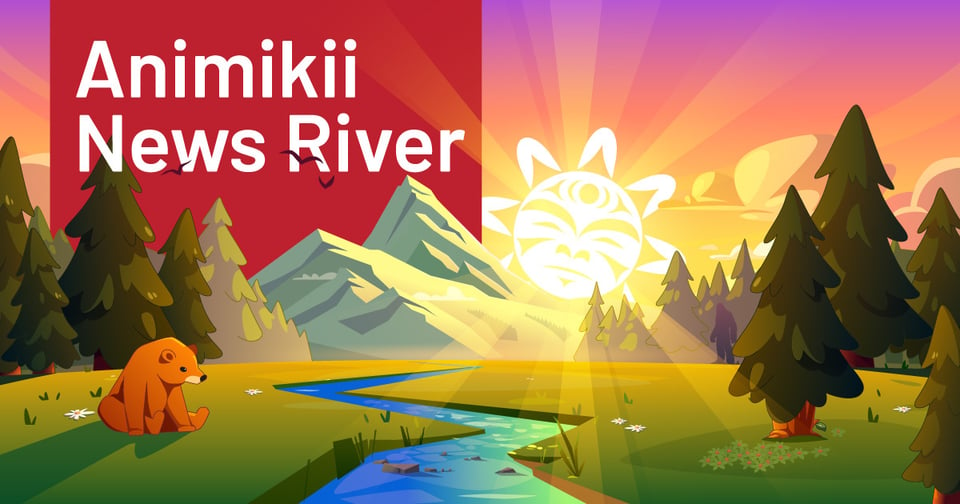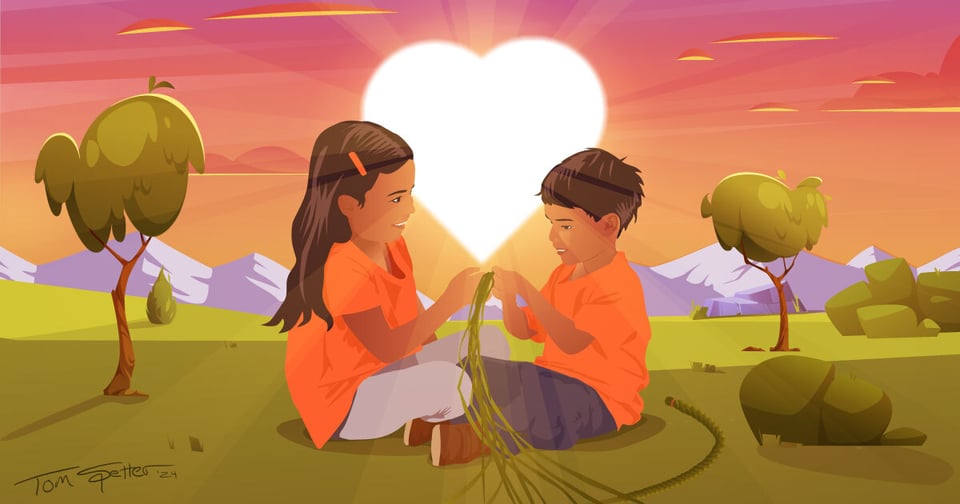Rooting into culture to impact policy
This week, we're talking Indigenous data provenance, a historical tech exit, and young voices on reconciliation.

Boozhoo News River Readers,
This week's News River brings you stories of interest about data provenance, the Indigenous-led revival of a popular Entrepreneurship program, and also data from the voices of Indigenous youth on reconciliation in Canada.
These stories are powerful examples of integrating Indigenous knowledge and perspectives in academic, economic and policy spaces for more just and equitable outcomes for all.
As always, we appreciate the time you spend here!
This week’s stories include:
New standard details the process for describing and recording the provenance of data about or related to Indigenous Peoples and their cultures, lands and knowledge systems.
Bobbie Racette makes history as Canada’s first tech exit by an Indigenous woman founder.
Consortium to ensure Indigenous community priorities, Indigenous research methodologies, data sovereignty and research ethics are respected in academic settings.

World Children’s Day is November 20
The big picture: Children and young people are powerful agents of change, bringing new ideas and perspectives that can help shape a better world for all of us. It’s time to listen to what they have to say. To understand what their lives are like and how their rights are present, missing, or pursued every day.
Why it matters: This project first emerged in 2019 from the understanding that very little large-scale research data exists that is designed and led by and for Indigenous youth in Canada. Since then the project continues to iterate and grow - with the voices of youth guiding the format and direction of the research.
Key points:
For the most recent report, Indigenous youth aged 18-29 were engaged through 7 in person events, 3 online sharing circles as well as 1 online survey.
4 themes emerged from the responses and data including: Personal and Community Empowerment; Culture Language and Wellness; Education and Meaningful Work, and Reconciliation & Solidarity.
Recommendations from the report that Indigenous youth are calling for include resources to build up every aspect of community living, more cultural spaces and programs where they live, and that reconciliation and public education effort be refocused on the truth component of truth and reconciliation.
What they’re saying: “When you reconnect, it’s jarring to see how much was lost. We don’t know what we did because everyone who knew that is gone. I feel really good when I see others reconnect. Not just doing it for yourself, but doing it for future generations, so they don’t feel the disconnect and they will be raised in the culture.” - Victoria Sharing Circle Participant.
Learn more: View the full barometer, learn about its methodology, and see the complete list of recommendations here.
Curated Articles:
A new standard developed with University of Arizona Indigenous data sovereignty expert Stephanie Russo Carroll at the helm outlines how scientists and technology professionals across an array of fields should record the provenance – or origin and history of use – for data about and relating to Indigenous Peoples. The Institute of Electrical and Electronics Engineers – known as IEEE and dubbed the "world's largest technical professional organization" – voted and approved the first-ever international standard regarding the "appropriate disclosure of Indigenous peoples' relationships and/or links to all data," which was published on Friday, Nov 14. The standard details the process for describing and recording the provenance of data about or related to Indigenous Peoples and their cultures, lands and knowledge systems. The development of IEEE Standards are overseen by the IEEE Standards Association while the content of those standards is "determined by a consensus body of materially interested parties," according to the organization.
Indigenous Research Network fosters partnerships to launch a global research consortium
The University of Toronto’s Indigenous Research Network (IRN) is strengthening international partnerships to establish the International Indigenous Research Consortium in alignment with its 2022-2027 strategic plan. The consortium’s vision is to foster global collaboration and knowledge exchange on Indigenous-led research, ensuring that Indigenous community priorities, Indigenous research methodologies, data sovereignty and research ethics are at the forefront and respected in academic settings. “We are building something that reaches across continents but is rooted in community values,” says Dale Turner, director of the IRN. “This work is not just about research; it’s about relationships, reciprocity and responsibility to each other and to the knowledge systems we are protecting and revitalizing together.”
OVHcloud, a global cloud player, today hosts its inaugural Canada's Innovation Future event alongside the Balsillie School of International Affairs (BSIA) and the Centre for International Governance Innovation (CIGI) in Waterloo. The event brings together thought-leaders, academics, and industry experts from Ontario's vibrant tech sector to address the intersection of innovation and regulation, focusing on fostering open, trusted and sustainable technologies. As Canada's digital landscape reaches a pivotal moment, discussions will center on creating frameworks that balance technological growth with responsible governance, particularly in areas like artificial intelligence (AI). As businesses increasingly adopt AI solutions, there is a growing emphasis on establishing regulatory frameworks that ensure ethical practices and protect data sovereignty. Addressing critical topics such as data sovereignty, AI adoption, and sustainability, this research provides key insights into the challenges and opportunities faced by tech organizations in their pursuit of technological freedom and efficiency.
Zirtual Acquires Virtual Gurus’ Virtual Assistant Division, Marking Historic Calgary Exit
Calgary startup Virtual Gurus has sold its Virtual Assistant division to U.S.-based Zirtual, marking what is believed to be Canada’s first tech exit by an Indigenous woman founder. The deal, structured as an asset purchase, is part of Zirtual’s aggressive scale-up strategy to consolidate leading players in the virtual assistant market into a more integrated, AI-powered platform. No financial terms of the deal were disclosed. For Calgary’s tech ecosystem, the milestone underscores both the growing maturity of the region’s startup scene and the rising influence of Indigenous and women founders in shaping the future of work. Founded in 2016 by Bobbie Racette after being laid off from the oil and gas sector, Virtual Gurus began quite literally at Racette’s kitchen table. What started as an idea to match businesses with virtual assistants who were often overlooked in traditional hiring cycles became one of North America’s most recognized talent-as-a-service platforms.
Shopify’s shuttered Indigenous entrepreneurship program will relaunch, says program co-founder
Build Native program was quietly cut in January alongside layoffs of Shopify’s Equitable Commerce team. The former Shopify employee who co-founded its Build Native entrepreneurship program is relaunching the initiative after the e-commerce giant quietly shuttered it earlier this year. Tracy Ridler, CEO of the Centre for Native Nation Builders and founder of the Build Native program within Shopify, announced on LinkedIn that her organization is launching “Build Native 2.0,” a renewal of the program that sought to uplift Indigenous entrepreneurs. Ridler did not say who the program’s partners would be, but added that more details, including board appointees and “big tech partners,” will come in December. BetaKit has reached out to Shopify for comment. “Shopify closed the program earlier this year. I chose not to let that be the end of our story. I brought Build Native home – back to community, back to purpose, back to commerce on our terms,” Ridler wrote.

Add a comment: